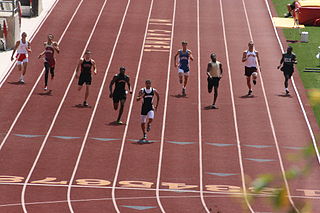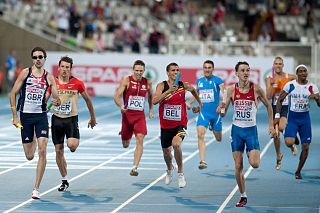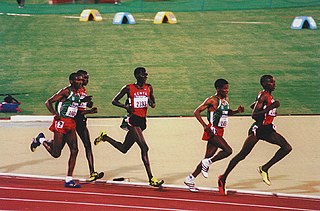
Athletics is a group of sporting events that involves competitive running, jumping, throwing, and walking. The most common types of athletics competitions are track and field, road running, cross-country running, and racewalking.

The decathlon is a combined event in athletics consisting of ten track and field events. The word "decathlon" was formed, in analogy to the word "pentathlon", from Greek δέκα and ἄθλος. Events are held over two consecutive days and the winners are determined by the combined performance in all. Performance is judged on a points system in each event, not by the position achieved. The decathlon is contested mainly by male athletes, while female athletes typically compete in the heptathlon.
World Athletics, formerly known as the International Amateur Athletic Federation and International Association of Athletics Federations, is the international governing body for the sport of athletics, covering track and field, cross country running, road running, race walking, mountain running, and ultra running. Included in its charge are the standardization of rules and regulations for the sports, certification of athletic facilities, recognition and management of world records, and the organisation and sanctioning of athletics competitions, including the World Athletics Championships. The organisation's president is Sebastian Coe of the United Kingdom, who was elected in 2015 and re-elected unopposed in 2019 for a further four years.

The 400 metres, or 400-meter dash, is a sprint event in track and field competitions. It has been featured in the athletics programme at the Summer Olympics since 1896 for men and since 1964 for women. On a standard outdoor running track, it is one lap around the track. Runners start in staggered positions and race in separate lanes for the entire course. In many countries, athletes previously competed in the 440-yard dash (402.336 m)—which is a quarter of a mile and was referred to as the 'quarter-mile'—instead of the 400 m (437.445 yards), though this distance is now obsolete.
The World Athletics Indoor Championships are a biennial indoor track and field competition served as the global championship for that version of the sport. Organised by the World Athletics, the competition was inaugurated as the World Indoor Games in 1985 in Paris, France and were subsequently renamed to IAAF World Indoor Championships in 1987. The current name was adapted with the name change of the sports governing body in 2019.

The European Athletics Indoor Championships is a biennial indoor track and field competition for European athletes that is organised by the European Athletic Association. It was held for the first time in 1970, replacing the European Indoor Games, its predecessor event first held in 1966.

The 200 metres, or 200-meter dash, is a sprint running event. On an outdoor 400 metre racetrack, the race begins on the curve and ends on the home straight, so a combination of techniques is needed to successfully run the race. A slightly shorter race, called the stadion and run on a straight track, was the first recorded event at the ancient Olympic Games. The 200 m places more emphasis on speed endurance than shorter sprint distances as athletes predominantly rely on anaerobic energy system during the 200 m sprint. Similarly to other sprint distances, the 200 m begins from the starting blocks. When the sprinters adopt the 'set' position in the blocks they are able to adopt a more efficient starting posture and isometrically preload their muscles. This enables them to stride forwards more powerfully when the race begins and start faster.

The 4 × 400 metres relay or long relay is an athletics track event in which teams consist of four runners who each complete 400 metres or one lap. It is traditionally the final event of a track meet. At top class events, the first leg and the first bend of the second leg are run in lanes. Start lines are thus staggered over a greater distance than in an individual 400 metres race; the runners then typically move to the inside of the track. The slightly longer 4 × 440 yards relay, on an Imperial distance, was a formerly run British Commonwealth and American event, until metrication was completed in the 1970s.

60 metres, or 60-meter dash, is a sprint event in track and field. It is a championship event for indoor championships, normally dominated by the best outdoor 100 metres runners. At indoor events, the 60 metres is run on lanes set out in the middle of the 'field', as is the hurdles event over the same distance, thus avoiding some of the effects of the banked track encircling the venue, upon which other track events in indoor events are run. At outdoor venues it is a rare distance, at least for senior athletes. The format of the event is similar to other sprint distances. The sprinters follow three initial instructions: 'on your marks', instructing them to take up position in the starting blocks; 'set', instructing them to adopt a more efficient starting posture, which also isometrically preloads their muscles. This will enable them to start faster. The final instruction is the firing of the starter's pistol. Upon hearing this the sprinters stride forwards from the blocks.

The European Athletics U23 Championships is a biennial athletics competition for European athletes under the age of 23, which is organized by the European Athletic Association. The oldest of the 'age-group' track and field events held by European Athletics - European Athletics U20 Championships are held in the same odd numbered years, while the European Athletics U18 Championships, previously the 'Youth Championships' are held in even numbered years.

The 10,000 metres or the 10,000-metre run is a common long-distance track running event. The event is part of the athletics programme at the Olympic Games and the World Athletics Championships, and is common at championship-level events. The race consists of 25 laps around an Olympic-sized track. It is less commonly held at track and field meetings due to its duration. The 10,000-metre track race is usually distinguished from its road running counterpart, the 10K run, by referring to the distance in metres rather than kilometres.

The 3000 metres or 3000-metre run is a track running event, also commonly known as the "3K" or "3K run", where 7.5 laps are run around an outdoor 400 m track, or 15 laps around a 200 m indoor track.
The World Athletics Combined Events Tour is an annual series of combined track and field events meetings, organised since 1998 by World Athletics, with heptathlon for women and decathlon for men. The winners are decided by totalling the number of points that the athletes have scored in each of three combined events competitions during the season. Points scored are determined by the World Athletics combined events scoring tables. The series includes annual independent combined events meetings as well as championship level combined events competitions, such as the World Athletics Championships and Olympic Games. It is the premier seasonal competition for decathletes and heptathletes, as combined events are not held for the Diamond League.

The World Para Athletics Championships, known as the IPC Athletics World Championships prior to 2017, are a biennial Paralympic athletics event organized by World Para Athletics, a subcommittee of the International Paralympic Committee (IPC). It features athletics events contested by athletes with physical and intellectual disabilities. The first IPC Athletics World Championships were held in Berlin, Germany in 1994.
The Arab Athletics Championships is an event organized by the Arab Athletic Association. It traditionally occurred every two years. It was not held in 1985 due to the schedule clash with the Pan Arab Games. However, due to the erratic scheduling of the games, both the athletics championships and games athletics competition have been held in the same year on several occasions since 1997. Typically, the championships is rescheduled to earlier in the year as a result. Women's events have been present on the programme since the second edition in 1979. The programme is usually combined although the women competed separately from the men for the tenth edition of the tournament, which was split between 1997 and 1998.

The World Para Athletics European Championships, known prior to 2018 as the IPC Athletics European Championships is an event organized by World Para Athletics, the international athletics federation established under the International Paralympic Committee (IPC) in 2016. Athletes with a physical disability compete, and there is also a specific category for athletes with an intellectual disability. Organised biennially, the original Games ran from 2003 to 2005 as an Open Championship but the event was frozen in 2005, but returned in 2012 in Stadskanaal, Netherlands.
The Balkan Athletics Indoor Championships, also known as the Balkan Indoor Games, is an annual international regional indoor track and field competition between athletes from the Balkans. Following a test event in 1991, it was officially launched in 1994. Organised by the Association of the Balkan Athletics Federations (ABAF), it is typically held in February. The competition complemented the long-running annual outdoor track and field tournament: the Balkan Games.

The 2019 World Para Athletics Championships was a Paralympic track and field event organised by the World Para Athletics subcommittee of the International Paralympic Committee. It was held in Dubai, United Arab Emirates from 7 to 15 November 2019. It was the 9th edition of the event, formerly known as the IPC Athletics World Championship prior to 2017.

Tajikistan competed at the 2019 World Championships in Athletics in Doha, Qatar, from 27 September to 6 October 2019.











